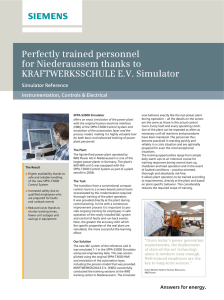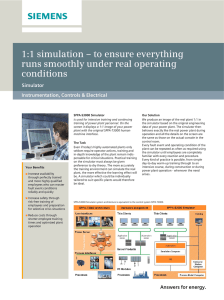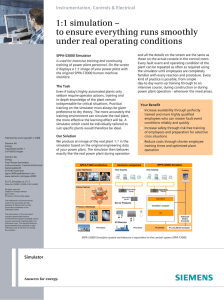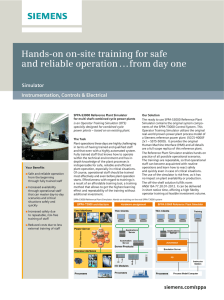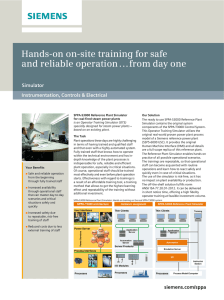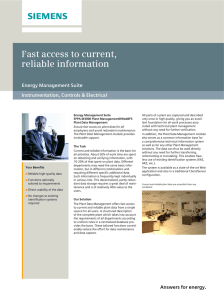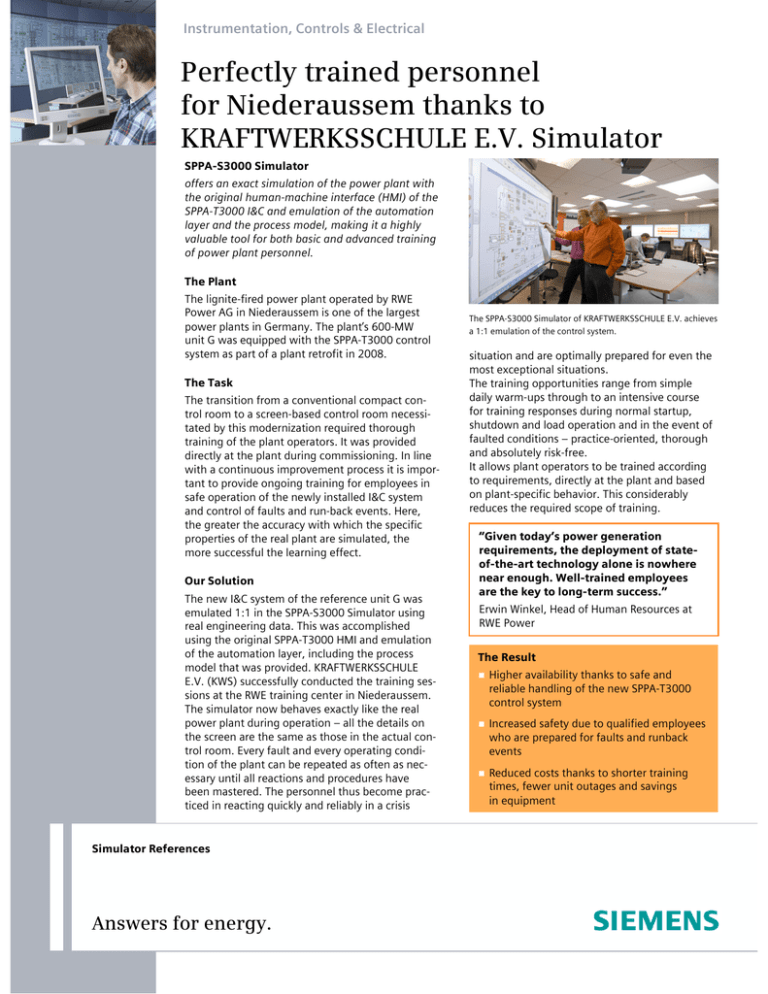
Instrumentation, Controls & Electrical
Perfectly trained personnel
for Niederaussem thanks to
KRAFTWERKSSCHULE E.V. Simulator
SPPA-S3000 Simulator
offers an exact simulation of the power plant with
the original human-machine interface (HMI) of the
SPPA-T3000 I&C and emulation of the automation
layer and the process model, making it a highly
valuable tool for both basic and advanced training
of power plant personnel.
The Plant
The lignite-fired power plant operated by RWE
Power AG in Niederaussem is one of the largest
power plants in Germany. The plant’s 600-MW
unit G was equipped with the SPPA-T3000 control
system as part of a plant retrofit in 2008.
The Task
The transition from a conventional compact control room to a screen-based control room necessitated by this modernization required thorough
training of the plant operators. It was provided
directly at the plant during commissioning. In line
with a continuous improvement process it is important to provide ongoing training for employees in
safe operation of the newly installed I&C system
and control of faults and run-back events. Here,
the greater the accuracy with which the specific
properties of the real plant are simulated, the
more successful the learning effect.
Our Solution
The new I&C system of the reference unit G was
emulated 1:1 in the SPPA-S3000 Simulator using
real engineering data. This was accomplished
using the original SPPA-T3000 HMI and emulation
of the automation layer, including the process
model that was provided. KRAFTWERKSSCHULE
E.V. (KWS) successfully conducted the training sessions at the RWE training center in Niederaussem.
The simulator now behaves exactly like the real
power plant during operation – all the details on
the screen are the same as those in the actual control room. Every fault and every operating condition of the plant can be repeated as often as necessary until all reactions and procedures have
been mastered. The personnel thus become practiced in reacting quickly and reliably in a crisis
Simulator References
Answers for energy.
The SPPA-S3000 Simulator of KRAFTWERKSSCHULE E.V. achieves
a 1:1 emulation of the control system.
situation and are optimally prepared for even the
most exceptional situations.
The training opportunities range from simple
daily warm-ups through to an intensive course
for training responses during normal startup,
shutdown and load operation and in the event of
faulted conditions – practice-oriented, thorough
and absolutely risk-free.
It allows plant operators to be trained according
to requirements, directly at the plant and based
on plant-specific behavior. This considerably
reduces the required scope of training.
“Given today’s power generation
requirements, the deployment of stateof-the-art technology alone is nowhere
near enough. Well-trained employees
are the key to long-term success.”
Erwin Winkel, Head of Human Resources at
RWE Power
The Result
Higher availability thanks to safe and
reliable handling of the new SPPA-T3000
control system
Increased safety due to qualified employees
who are prepared for faults and runback
events
Reduced costs thanks to shorter training
times, fewer unit outages and savings
in equipment
Published by and copyright © 2010:
Siemens AG, Energy Sector
Freyeslebenstrasse 1
91058 Erlangen, Germany
Siemens Power Generation, Inc.
Instrumentation & Controls
1345 Ridgeland Parkway, Suite 116
Alpharetta, GA 30004, USA
sppa-s3000.energy@siemens.com
www.siemens.com/sppa-s3000
For more information, contact our
Customer Support Center.
Phone: +49 180 524 70 00
Fax:
+49 180 524 24 71
(Charges depending on provider)
E-mail: support.energy@siemens.com
Fossil Power Generation Division
Instrumentation, Controls & Electrical
S3_FR_Niederaussem_e_V1-0
Order No. E50001-G230-A265-X-4A00
Printed in Germany
Dispo 05401, c4b: 7465
Printed on elementary chlorine-free
bleached paper.
All rights reserved.
Trademarks mentioned in this document are
the property of Siemens AG, its affiliates, or
their respective owners.
Subject to change without prior notice.
The information in this document contains general
descriptions of the technical options available,
which may not apply in all cases.
The required technical options should therefore be
specified in the contract.

